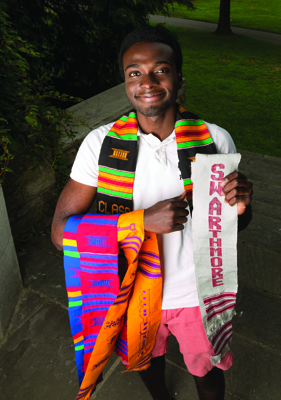The Stoles That Stole the Show

House of Stole entrepreneur and education philanthropist Isaac Opoku ’14 says that one of his role models is fellow Ghanaian Patrick Awuah ’89, founder of Asheshi University. Photo by Laurence Kesterson
Anyone attending Swarthmore’s 2011 Commencement ceremony couldn’t help but notice the beautifully patterned stoles worn by some male graduates. Those who looked carefully would have seen the Delta Upsilon fraternity insignia woven into the stoles’ fabric. That year’s graduating DU brothers had received the stoles as a gift from the mother of DU brother Peter Opoku ’11 from Ghana. The stoles were so admired that the following year, Peter, his younger brother Isaac ’14, their mother, and their friend Duke Yeboah ’13 founded a business—the now burgeoning House of Stole.
Isaac explains that the stoles are made from kente, a fine, hand-woven fabric of blended silk and cotton and native to South Ghana. He recounts a legend of the fabric’s origin, of how two friends out hunting encountered a spider weaving a beautiful web. For two days, they observed the spider, then returned home and replicated the weave.
Throughout 2012, Peter, Isaac, and Duke advertised the business via friends at colleges around the United States. Their first client was a black student organization at Harvard. Since then, they’ve sold stoles at schools including the University of Wisconsin, DePaul University, Skidmore, and Calvin colleges—and Swarthmore’s Intercultural Center (IC). “We had a pretty good order from them, because they bundled the IC together with organizations for people of color SASA, SASS, ENLACE, and others,” says Isaac. Peter adds that they are now the “stole providers” for Harvard’s Graduate School of Education.
Each of the entrepreneurs has his own function in the business: Peter, a financial analyst in Chicago, heads the company and handles the finances. “My key role is informing potential customers about the business and how we aim to use some of the profits to further education in Ghana,” says Peter. “Three milllion students in the United States graduate every year. If we can get 10 percent to buy stoles, that’s a lot of money to help further African education,” he adds.
Isaac is responsible for the company’s website and for designing the stoles according to clients’ wishes. He’s now constructing an online feature that will allow clients to design their own stoles. The stoles are hand-woven, according to tradition, by hired professional Ghanaian weavers on handlooms. The Opokus' mother handles packaging and shipping.
Duke upholds the community service role of the business. “Right now we’re examining our numbers to see how much we can afford to give away,” he says. “We’re still building the company and have expenses to cover, so we’re looking for things like backpacks, notebooks, supplies that all kids need but don’t have.” g
—Carol Brévart-Demm
 Email This Page
Email This Page